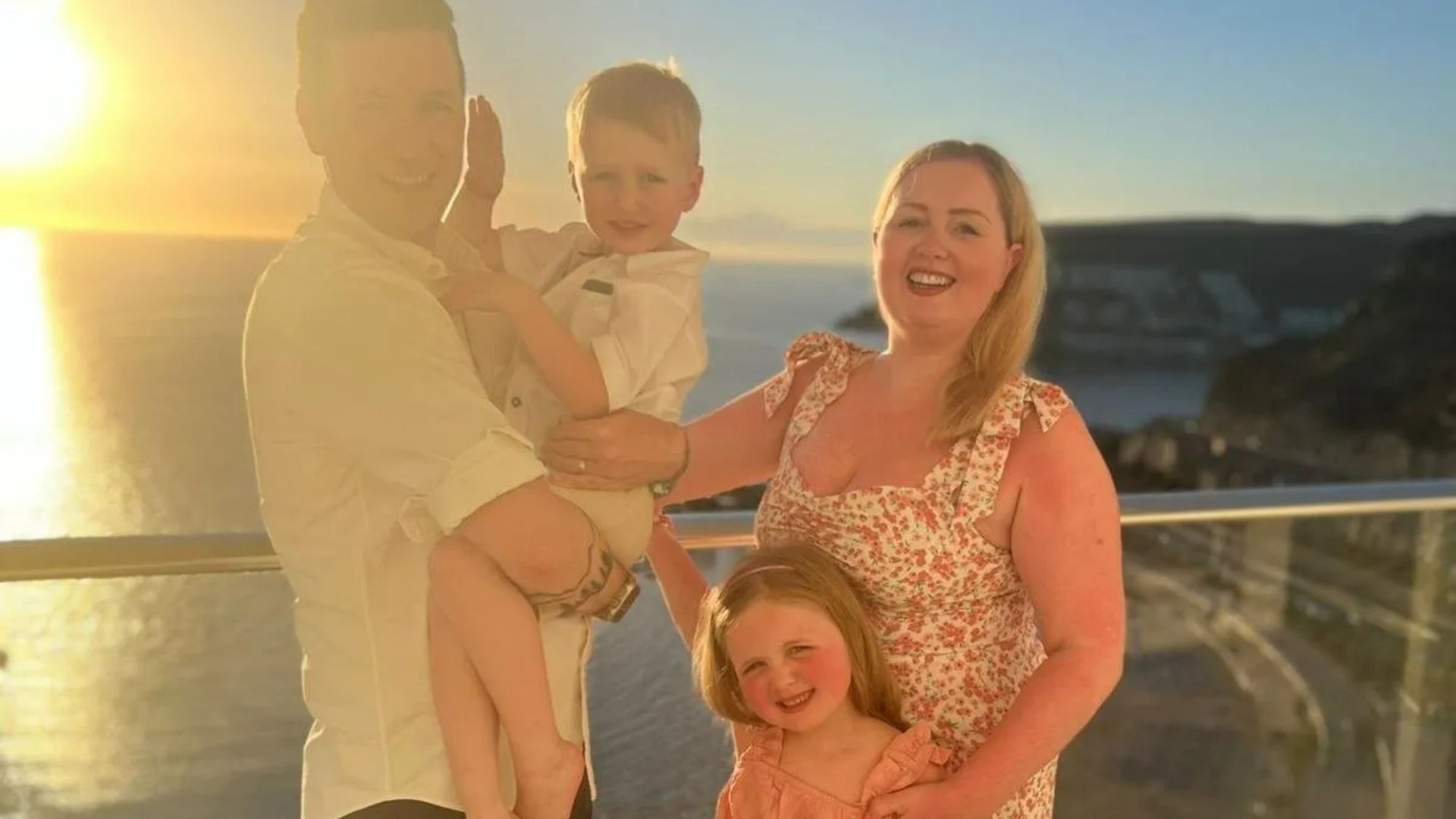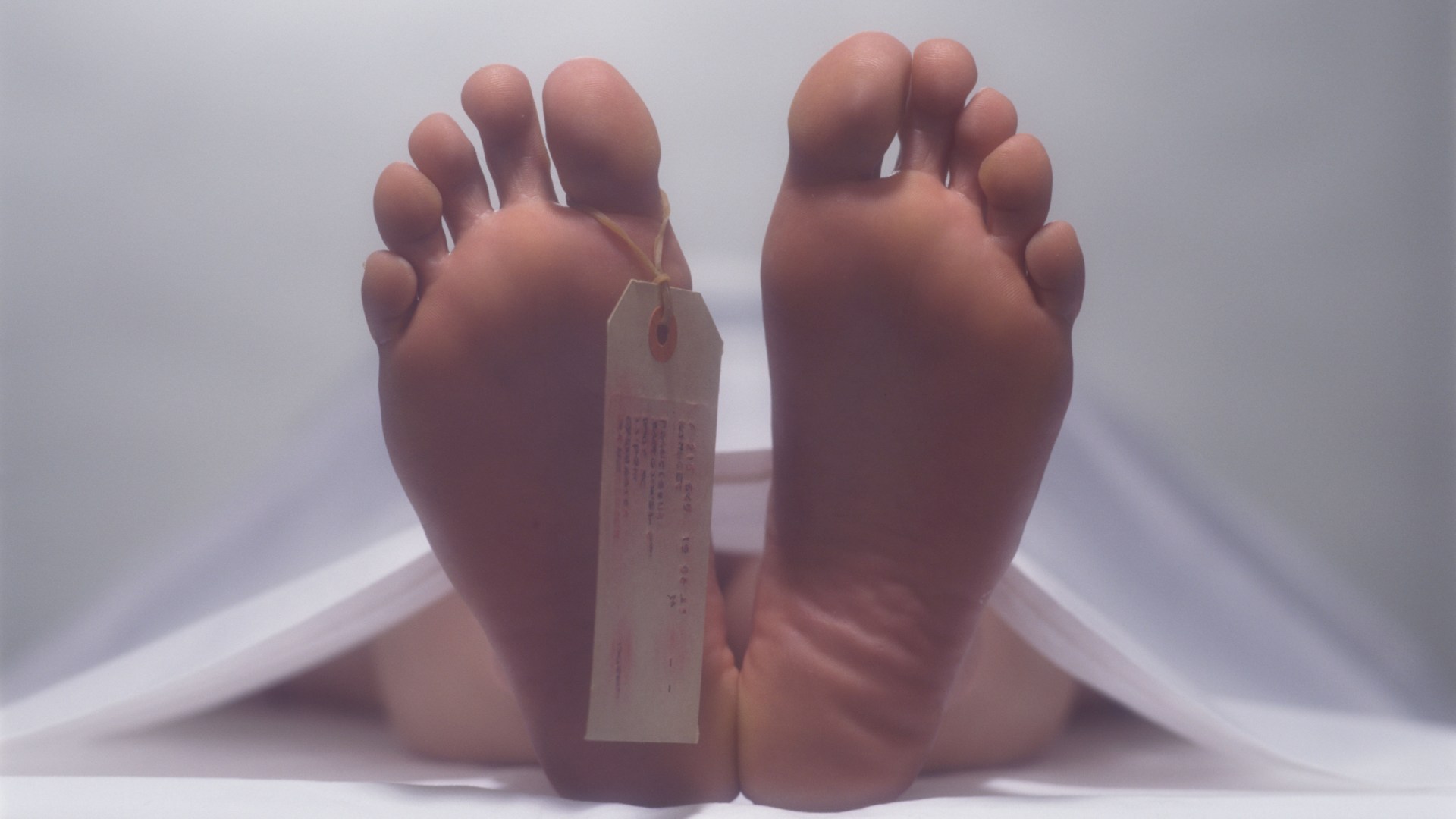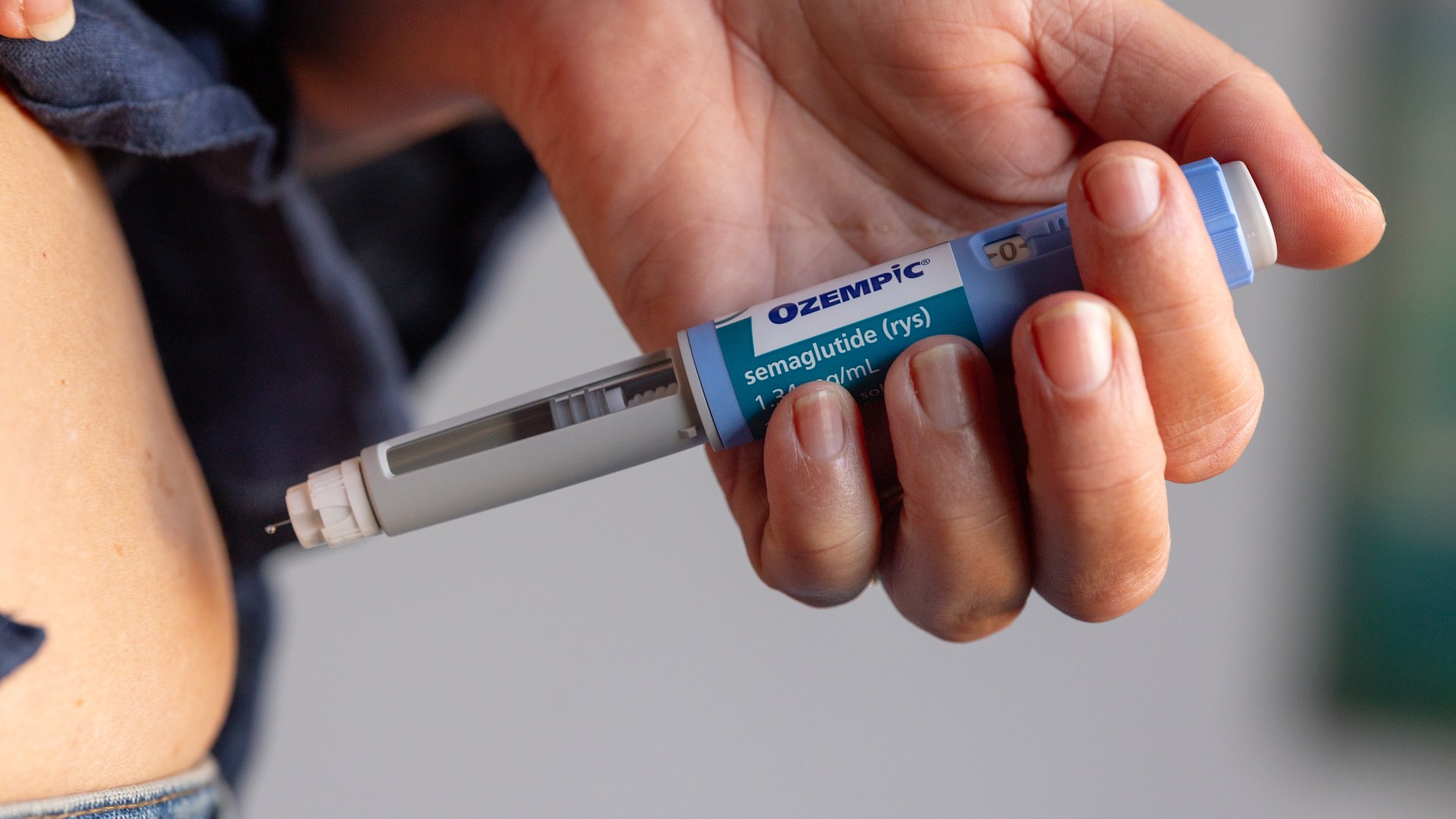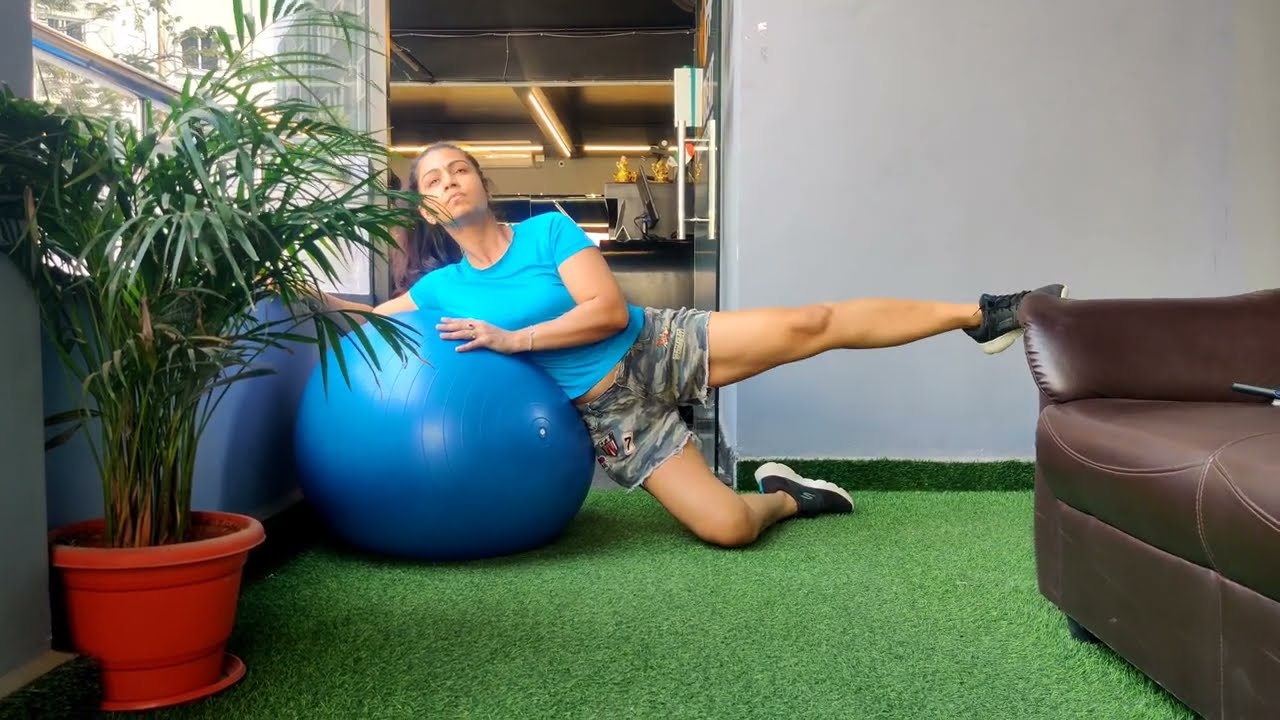Health & fitness
Doctors blamed stabbing pains in my back on lifting my kids – now it’s too late, I’m waiting to die

A MUM who was told by doctors her bad back could be muscular problems from lifting her kids was devastated when the pain was diagnosed as a terminal condition.
Jennifer McNeill, 34, said her symptoms started when she began experiencing a stabbing pain in her back and could barely walk.
The mum-of-two, from Gourock, Scotland, went to see her GP, who recommended she do physiotherapy for three weeks.
But the pain got worse and after undergoing several tests and scans she was told she had stage four breast cancer which had spread to her spine.
Because her cancer had already spread, medics were unable to operate to remove the cancer and Jennifer was told her illness was terminal.
She said: “The pain was so bad that it forced me to the ground and my partner had to lift me up because I could not stand up.
“I went to the hospital and they put it down as muscular pain
“I was in complete agony for months. When the pain first started, Aidan was one and Millie was two.
“The doctors said I had probably strained it whilst lifting them. It went on for months and got so severe that I could barely walk.
“I just couldn’t believe that after many visits to the hospital and to many doctors that it was terminal cancer and it was too late to do anything – it had already spread to my back and I haven’t had any issues with my breasts.”
Jennifer was forced to seek private medical care to get a MRI scan of her lower back, which identified two fractures in her spine.
When the pain spread down her legs and she was unable to pass urine she attended the A&E department at Inverclyde Royal Hospital in July 2021.
Doctors then ordered a CT scan and discovered a cancerous tumour on her spine.
Talking about the moment she was diagnosed, Jennifer said it was her children Millie, now 6, and Aidan, now 4, she thought of.
She said: “As soon as I was diagnosed I didn’t know if I would see the next couple of weeks. I was scared, they were babies at the time.
“There were plans I was making ahead, family holidays and looking into schools.
I have so many wonderful people in my life who have supported me so much. Honestly, if love could save me, I’d be cured already.
Jennifer McNeill
“I was devastated and in shock. I never thought I had cancer, because obviously it never showed up when I had my scans and when I went private so there were lots of unanswered questions that I had.”
Jennifer was offered several rounds of radiation, chemotherapy and has been taking the chemo drug Enhertu.
She decided not to tell her kids about the cancer. She said: “By telling them that I have a sore back they know that I won’t be able to lift them and it is the truth because I am restricted to what I can do.
“You don’t want to tell them that you have cancer and that you have got a terminal illness and a timeline.”
What are the signs of breast cancer?
BREAST cancer is the most common type of cancer in the UK.
The majority of women who get it are over 50, but younger women and, in rare cases, men can also get breast cancer.
If it’s treated early enough, breast cancer can be prevented from spreading to other parts of the body.
Breast cancer can have a number of symptoms, but the first noticeable symptom is usually a lump or area of thickened breast tissue.
Most breast lumps aren’t cancerous, but it’s always best to have them checked by your doctor. You should also speak to your GP if you notice any of the following:
- a change in the size or shape of one or both breasts
- discharge from either of your nipples (which may be streaked with blood)
- a lump or swelling in either of your armpits
- dimpling on the skin of your breasts
- a rash on or around your nipple
- a change in the appearance of your nipple, such as becoming sunken into your breast
Source: NHS
Jennifer said her life has completely changed now and “it’s been turned upside down”.
She continued: “All I can do it put on a brave face and pretend I’m okay for the sake of my children.
“I don’t want to scare them, but the sad reality is this is how they know their mummy.
“They expect me to be in bed, to be in pain and to be unable to walk. This is our life now.
“I want to live each day to the max for my children, but I can’t due to pain and mobility. It kills me.
“I have so many wonderful people in my life who have supported me so much. Honestly, if love could save me, I’d be cured already.”
October is Breast Cancer Awareness month and as Jennifer receives ongoing treatment she’s stressing how important it is to get checked regularly.
Over the last few years, Kevin McNeil, Jennifer’s husband of eight years, and several friends have raised over £30,000 for the hospice to show their appreciation and are planning to do more events and activities to collect more funds.
To donate, visit their JustGiving page.
How to check your breasts
It is important to regularly check your breasts for any changes. Breast tissue reaches all the way up to your collarbone and across to your armpit, so it’s vital to check these areas too.
If you feel or see any changes in your breast you should always consult your GP.
Charity CoppaFeel! recommends checking your breasts monthly, so you can pick up on any changes quickly.
Breasts do change naturally as part of your monthly menstrual cycle, so you should get to know your breasts, how they feel and what changes they usually go through to know if anything is out of the ordinary.
Five-step check
There is a five-step self exam you can do at home to check for any changes.
Step one: Begin by looking in a mirror, facing it with your arms on your hips and your shoulders straight. You should be looking for any dimpling, puckering, bulging skin, redness, soreness, a rash or changes in the nipple.
Step two: Still looking in the mirror, raise both arms above your head and check for the same changes.
Step three: With your arms still above your head, check for any fluid coming from the nipples. This can include milky, yellow or watery fluid, or blood.
Step four: While lying down use your opposite hand to check each breast. Using a few fingers, keeping them flat and together, go in a small circular motion around your breasts. Make sure you feel the entire breast by going top to bottom in these small circles. It helps to develop a system or pattern to make sure every inch is covered. Use light pressure for the skin and tissue just beneath, medium pressure for the tissue in the middle of your breasts, and firm pressure to feel the tissue at the back, feeling down to your ribcage.
Step five: Feel your breasts while either standing or sitting, using the same small circular motions.
Health & fitness
Horrifying reality of ‘rogue’ funeral directors laid bare at inquiry into NHS morgue monster who raped corpses

FUNERAL directors must be regulated to stop rogue operators, warn experts investigating the NHS morgue monster David Fuller.
Fuller was sentenced to life in prison for murdering two women and sexually abusing the bodies of more than 100 at hospitals in Kent.
Sir Jonathan Michael, chair of the inquiry into his crimes, said the funeral industry needs urgent reform.
He said he has sped up his work due to “recent distressing reports”.
Three people were arrested in the summer in connection with a funeral home in Hull, East Yorks, after families found loved ones’ remains had been mixed up or lost.
Past incidents have seen bodies treated inappropriately or left to rot in funeral parlours.
Read more on David Fuller
NHS hospital mortuaries have also been found to be too small, too warm or not properly secured.
Anyone can set themselves up as a funeral director and keep the bodies in their garage without anybody being able to stop them. That cannot be right
Sir Jonathan Michael
The Fuller inquiry found funeral directors do not need a licence, qualifications or training, and described the sector as an “unregulated free-for-all”.
Sir Jonathan said: “It is clear to me that many people believe or assume that the sector is already regulated, and they are shocked to find this is not the case.
“The fact is that anyone can set themselves up as a funeral director.
“They could do it from their home and keep the bodies of the deceased in their garage without anybody being able to stop them.
“That cannot be right.
“My hope is that publishing this interim report now will assist both the Government and the funeral sector itself to take steps that assure the public that care in the funeral sector is fit for purpose.
“We need a regulatory regime that will not tolerate any form of abuse or any practices that compromise the security and dignity of the deceased.”
Health Secretary Wes Streeting said: “The Government is committed to preventing any similar atrocities happening again and ensuring
that the deceased are safeguarded and treated with dignity.”
FULLER ‘FREE TO OFFEND’ DUE TO HOSPITAL FAILINGS
MORGUE monster David Fuller was free to assault dead women for 15 years due to “serious failings” at the hospitals where he worked, a report found.
The double killer abused at least 101 women while working at mortuaries in Tunbridge Wells Hospital and at the former Kent and Sussex Hospital.
A probe found there were “missed opportunities” to stop the necrophiliac’s 15-year rampage.
His youngest victim was a nine-year-old girl and the oldest was 100 years old, with Fuller sometimes violating the bodies more than once.
Inquiry chairman Sir Jonathan Michael said: “Failures of management, of governance, of regulation, failure to follow standard policies and procedures, together with a persistent lack of curiosity, all contributed to the creation of the environment in which he was able to offend, and to do so for 15 years without ever being suspected or caught.
“Over the years, there were missed opportunities to question Fuller’s working practices.
“Had his colleagues, managers and senior leaders been more curious, it is likely that he would have had less opportunity to offend.”
Health & fitness
Women are having their pain dismissed more than men at almost EVERY stage of their lives, research reveals

WOMEN are having their pain dismissed more than men at almost every stage of their lives, according to research.
A study of 5,000 adults examined how everyday pain is poorly understood and mistreated, with 81 per cent of 18-24-year-old women feeling their pain is ignored or dismissed.
This compares to just 73 per cent of men of the same age.
While more than half of women aged 45 and over feel they have been ignored or dismissed, this drops to 49 per cent of men.
In addition, four in 10 women with menopause-related pain had it dismissed or ignored, and one in six women over 45 claimed it took longer than a year for the cause of their suffering to be diagnosed.
Overall, 19 per cent of all women felt their pain was dismissed by healthcare professionals for more than five years compared to 16 per cent of men.
Read more on women’s health
As a result, one in five said their career has been impacted because of their pain.
The research was commissioned by Nurofen and its parent company Reckitt, as part of its latest Gender Pain Gap Index Report, which has been tracked annually since 2022.
Gabby Menezes-Forsyth, 25, suffered extreme period pain as a teenager before an endometriosis diagnosis.
She said: “I felt from an early age that the extreme period pain I was experiencing seemed to be worse than others, but I didn’t have a frame of reference for what was normal.
“I felt dismissed as ‘dramatic’ by everyone – from loved ones to teachers. In frequent trips to the GP, their dismissal never appeared cruel or to suggest that I wasn’t in pain, but rather that there was nothing they could do.
“Ultimately, it was only after suffering a miscarriage at age 22 that I was diagnosed with a biconcave uterus and endometriosis.
“Even with the clarity that the diagnosis offered, it was a difficult realisation to come to, understanding that this would always be something that would impact my life.”
The research shows that the average Gap stands at seven per cent, indicating that more women than men have had their pain ignored or dismissed.
While this year’s Gap has narrowed (two per cent in 2024 vs 11 per cent in 2023), a higher number of women felt their pain was ignored or dismissed (62 per cent in 2024, 49 per cent in 2023 and 56 per cent in 2022.
A third of women felt it has impacted their mental health – up from a quarter in the 2023 report.
And one in four even started to question their own sanity, believing their pain wasn’t real after having it dismissed.
Clare Knox, founder and CEO of See Her Thrive, said: “So much is talked about the Gender Pay Gap – a similar issue, which needs fixing.
“But this report shows the Gender Pain Gap is also holding so many women back from reaching their true potential and climbing the career ladder.
“We need to start supporting women to thrive in every aspect of their lives, whether that’s helping them manage pain so they can carve out the career they want, or working with organisations to create environments which empower women’s health in the workplace.”
It also emerged the workplace was found to be one of the most common places for pain to have been overlooked for 40 per cent of women.
And only a fifth are comfortable talking about their pain to HR or their manager in the workplace.
But the dismissal by a health care professional is happening as young as between 10 and 15 for one in 10 girls.
Dr Bill Laughey, senior medical scientist at Reckitt, which has also announced a partnership with Plan International UK to support girls’ health literacy, said: “With three years of data, we can now start to see the nuances of how women’s pain is dismissed and, crucially, use this insight to help address gender biases for those who experience it the most.
“This complements our wider commitments to our research programmes, working with Imperial Consultants, London to identify what education the next generation of HCPs want to see while supporting the Royal College of GPs in providing training around gender bias in primary care settings.”
Womens Workouts
35 MIN Full Body Workout: Vier Runden Intervalltraining mit Kaya Renz 💥 | ohne Geräte

Hier kommt ein Full Body Workout, das es in sich hat! Zusammen mit Fitness-Coach Kaya kannst du in 35 Minuten deinen ganzen Körper trainieren und deinen Puls ordentlich nach oben treiben.
Dich erwarten vier Runden Intervalltraining, ein Tabata und eine kleine, schweißtreibende Überraschung am Schluss. Bist du bereit? Auf geht’s!
Hier findest du mehr Videos von Kaya Renz:
YouTube: https://www.youtube.com/channel/UCN_hKvlq5WuakrFDoOA-Ipw *
Instagram: https://www.instagram.com/kaya_renz/ *
Web: https://www.kayarenz.de/ *
Für dieses Training brauchst du keine Geräte, eine Matte und dein eigenes Körpergewicht reichen vollkommen aus. Viel Spaß!
Du willst noch mehr trainieren? Hier sind noch ein paar Vorschläge für dich:
16 MIN Workout: Oberkörper-Training mit Kaya Renz | ohne Geräte 💥
17 MIN Faszientraining: Das Blackroll-Workout gegen Muskelkater | mit Kaya Renz 🧘♀️
4 MIN Tabata: Intensives Ganzkörper-Workout mit Kaya Renz 🧭 | mit Miniband
00:00 Intro
00:29 Warm-up
07:27 Zirkel Nr. 1
12:20 Zirkel Nr. 2
16:57 Zirkel Nr. 3
21:49 Zirkel Nr. 4
26:19 Tabata
30:49 kleine Überraschung
32:00 Cool Down
___
(*Werbung wg. Verlinkung)
source
Health & fitness
Mass rollout of fat jabs to unemployed will ‘overwhelm’ the NHS – as clinics already struggle with demand

Weight loss jabs are a hot media topic at the moment, with hundreds of success stories from people who shed the pounds.
In March 2023, the NHS announced it would make Wegovy, a drug made by Danish firm Novo Nordisk, available on prescription to thousands of obese Brits.
It contains the drug semaglutide, which is said to have helped reality star Kim Kardashian and Twitter boss Elon Musk lose weight.
Wegovy, which helped a third of people reduce their weight by 20 per cent in trials, is now available from pharmacies like Boots.
How do they work?
The jabs work by suppressing your appetite, making you eat less and therefore lose weight.
To do this, semaglutide mimics the role of a natural hormone, called GLP-1.
GLP-1 is part of the signalling pathway that tells your body you have eaten, and prepares it to use the energy that comes from your food.
London GP and founder of wellgoodwellbeing.com, Dr Zoe Watson, said: “Your body naturally produces an appetite regulating hormone called glucagon-like peptide-1.
“These jabs work by regulating your appetite, which can lead to eating fewer calories and losing weight.”
Aren’t they diabetes drugs?
Semaglutide, the active drug in Wegovy, was originally sold under the name Ozempic specifically for diabetes patients.
But people started noticing it helped suppress their appetites, stopping them eating as much and helping them shed the pounds.
Novo Nordisk then developed Wegovy, which contains the same chemical but at higher doses specifically to aid weight loss.
Wegovy is not prescribed for diabetes patients.
Can I get them?
Wegovy is offered on prescription to obese adults given specialist weight loss treatment.
The NHS currently also offers a similar drug called Saxenda, or liraglutide.
Both are only available throught specialist weight management services, which means you have to be referred to clinics led by experts.
GPs can’t prescribe them on their own, Dr Watson said.
The jabs have to be taken as part of an overall programme to help with lifestyle changes and psychological support to get the best effect from the medication prescribed.
Are there any risks?
Like all medicines, the jabs do not come without side effects.
Around half of people taking the drug experience gut issues, including sickness, bloating, acid reflux, constipation and diarrhoea.
Dr Sarah Jarvis, GP and clinical consultant at patient.info, said: “One of the more uncommon side effects is severe acute pancreatitis, which is extremely painful and happens to one in 500 people.”
Other uncommon side effects include altered taste, kidney problems, allergic reactions, gallbladder problems and hypoglycemia.
What other options are there?
Mounjaro (brand name for tirzepatide) also came onto the market in early 2024.
Like Wegovy, tirzepatide stems from a drug originally designed to treat diabetes.
The weekly injection helped overweight people drop more than two stone in 18 months.
It is available with to order with a prescription online from pharmacies including Superdrug and LloydsPharmacy Online Doctor.
It works in a similar way to Wegovy and Saxenda, but is more effective.
Dr Mitra Dutt from LloydsPharmacy says: “Based on clinical trials, 96 per cent of people were able to lose more than five per cent of their body fat using Mounjaro. In similar trials, 84 per cent of people lost more than five per cent of their body weight on Wegovy, and 60 per cent on Saxenda.
“Mounjaro works by activating two hormonal receptors (GIP and GLP-1), which enhance insulin production, improve insulin sensitivity, and work to decrease food intake.”
Womens Workouts
WORKOUT FOR PREGNANT WOMEN
Health & fitness
Bake Off star slammed for ‘trivialising’ serious health condition with ‘offensive’ comments

GREAT British Bake Off star Ravneet Gill has issued an apology after making “harmful” comments on spinoff show An Extra Slice.
The chef and author, 33, appeared on the Channel 4 programme alongside host Jo Brand and guests Jonathan Ross and Josh Pugh on October 10.
While discussing the Bread Week challenges, Gill told the panel: “Well, I love bread, but my mum’s coeliac so she shouldn’t eat bread, but she still loves it, she still eats it.”
Her remarks were criticised by the Coeliac UK, and hundreds of viewers with the autoimmune condition, which requires a strict gluten free diet and affects one in 100 people.
In an open letter to the Bake Off producers, charity CEO Hilary Croft said Gill had “trivialised” coeliac disease, which can lead to severe pain, recurrent miscarriage and even bowel cancer if not properly managed, and “sent a harmful message to the public”.
In response, the Junior Bake Off judge said on Instagram: “I want to make it really clear that my intention was not in any way to cause any misinformation about the severity of coeliac disease or to downplay it at all.
READ MORE ON COELIAC DISEASE
“For that, I hold my hands up and that was really never my intention.”
She added: “For those of you that don’t know me, I thought I’d provide a bit of context to my work and what I do.
“When I was in my 20s, I worked in London’s first gluten-free restaurant, long before platforms like YouTube and Instagram were as big, and I spent a lot of time educating myself.
“I also have spent the last year writing a lot more gluten free recipes for the community, and that’s because I get asked about them a lot.
“I just want to circle back and let you know that I didn’t intend for those comments to cause harm, and the fact that they did really upset me, and I’m sorry about that.”
She insisted that her mum isn’t upset, and that “in a fast-moving panel show, sometimes it’s hard and you can’t get your words out, and I should have provided more context”.
Brand saw the funny side, saying of Gill’s mum: “Good for her.”
“And good for whoever cleans up after her,” Ross joked, followed by laughter from the studio audience.
Croft “expressed concern” over the interaction, as did several influencers and hundreds of social media users.
One person wrote on X, formerly Twitter: “Her comments were ridiculous.
“Eating gluten when you have coeliac disease is extremely damaging and you should not be encouraging this.”
While another said: “It was unbelievable. Ravneet is a Junior Bake Off judge!
“I can’t believe how ill-informed she is and how coeliac disease was trivialised.”
And gluten free blogger Becky Excell said: “This is so frustrating when we are all working so hard to raise awareness of coeliac disease in the right ways, and especially with it not being too far from the festive season when we really need everyone to understand more than ever.
“It’s especially frustrating when a programme isn’t even live as itcould have been stopped from being aired.
“Following a gluten free diet isn’t for fun or enjoyment, it’s not a choice.”
In a public letter to the producers of An Extra Slice, Croft said: “We are writing to you as Coeliac UK, the national charity representing the interests of people living with coeliac disease.
“We would like to express our concern regarding the comments made by Ravneet Gill during the latest episode of An Extra Slice (series 15, episode 3), which aired on October 10 at 8pm.
“During the show, Gill made light of coeliac disease when discussing her mother’s condition.
“The comments [made by Gill, Brand and Ross] trivialise coeliac disease and send a harmful message to the public.
“Coeliac disease is a serious autoimmune condition where the ingestion of gluten triggers an immune response that damages the gut lining, leading to nutrient malabsorption and a host of potential health complications.
“Even the smallest crumb of gluten can cause severe symptoms, including debilitating pain, prolonged suffering and even recurrent miscarriage, as well as long-term health risks such as osteoporosis and, in rare cases, small bowel cancer.
My view, as someone with coeliac disease

By Alice Fuller, Senior Health Reporter
WE all know that Ravneet Gill, Jo Brand and Jonathan Ross were joking.
And it was funny, as eating gluten when you have coeliac disease really can make a mess!
But while I can laugh, it is also incredibly disappointing.
As someone with the condition, I can’t tell you how frustrating it is when people just don’t get it.
I have my own toaster, butter and jam, I use a separate chopping board, and I avoid anything labelled ‘may contain gluten’ or ‘made in a factory that handles gluten’.
I also have to do extensive research when going out for dinner and I always carry a cereal bar in my bag in case I can’t find anywhere safe to eat.
It’s a nightmare, and when people make light of eating bread when it could make you seriously ill, it only adds to the misunderstanding.
Coeliac disease is serious, and it needs to be taken seriously.
“It is crucial to emphasise that coeliac disease is not a food preference or an allergy; it is a serious medical condition that requires lifelong adherence to a strict gluten free diet.
“We are particularly disheartened by Gill’s comments given her previous role as a judge on the Junior Bake Off, where she displayed compassion for those that have been diagnosed.
“The remarks made during An Extra Slice perpetuate a narrative that dismisses the severity of this condition.
“They suggest that individuals with coeliac disease and the physical and mental health implications of adhering to a gluten free diet.
I want to make it really clear that my intention was not in any way to to downplay coeliac disease at all
Ravneet Gill
“Discussions around gluten free diets should promote accurate understanding, respect, and accommodation for dietary needs rather than downplaying their significance.
“We are hopeful that this incident will encourage your team to engage in respectful conversations regarding coeliac disease and its impact on individuals and families.
“We would appreciate the opportunity to discuss this matter further and provide accurate information about coeliac disease to ensure a more informed dialogue in future broadcasts.
“We kind request that you consider issuing an apology to people with coeliac disease on air to address the dismissive and inaccurate portrayal of coeliac disease presented in your programme.
“Thank you for your attention to this important matter. We look forward to your response.”
Gill said she will try to “think more carefully” before speaking on TV again.
Channel 4 has been approached for comment.
Vanessa Feltz faced similar backlash after comments she made on This Morning last year.
More than 2,000 complaints were made to Ofcom after saying a caller’s mother-in-law not allowing them to bring their own food to a gluten free Christmas dinner was “completely unreasonable”.
“She’s treating coeliac disease as if it’s a potentially fatal peanut allergy and they can’t have anything with gluten in the house,” Feltz added.
The 61-year-old later apologised on her TalkTV show, saying she was “very sorry”.
What is coeliac disease and what are the main symptoms?
COELIAC disease is an autoimmune condition that affects one in 100 people in the UK – though many remain undiagnosed.
When someone who has it eats gluten, their immune system attacks their own tissues, which damages their gut.
The symptoms vary from person to person and can range from very mild to severe.
But the most common signs include:
- Severe or occasional diarrhoea, excessive wind and/or constipation
- Persistent or unexplained nausea and vomiting
- Recurrent stomach pain, cramping or bloating
- Any combination of iron, vitamin B12 or folic acid deficiency
- Anaemia
- Tiredness
- Sudden or unexpected weight loss
- Mouth ulcers
- Skin rash (dermatitis herpetiformis)
- Tooth enamel problems
- Liver abnormalities
- Unexplained subfertility
- Repeated miscarriages
- Neurological (nerve) problems such as ataxia (loss of coordination, poor balance) and peripheral neuropathy (numbness and tingling in the hands and feet)
There is no cure. The only way to manage coeliac disease is with a strict gluten free diet.
This means eating no wheat, rye, barley and oats.
Potential long-term complications include osteoporosis, iron deficiency anaemia, vitamin B12 or folate deficiency anaemia, bowel cancer and fertility issues.
Source: Coeliac UK and NHS
-

 Science & Environment4 weeks ago
Science & Environment4 weeks agoHyperelastic gel is one of the stretchiest materials known to science
-

 Technology4 weeks ago
Technology4 weeks agoWould-be reality TV contestants ‘not looking real’
-

 Science & Environment4 weeks ago
Science & Environment4 weeks agoHow to unsnarl a tangle of threads, according to physics
-

 Science & Environment4 weeks ago
Science & Environment4 weeks ago‘Running of the bulls’ festival crowds move like charged particles
-

 Science & Environment4 weeks ago
Science & Environment4 weeks agoMaxwell’s demon charges quantum batteries inside of a quantum computer
-

 Science & Environment4 weeks ago
Science & Environment4 weeks agoLiquid crystals could improve quantum communication devices
-

 Technology3 weeks ago
Technology3 weeks agoIs sharing your smartphone PIN part of a healthy relationship?
-

 Womens Workouts3 weeks ago
Womens Workouts3 weeks ago3 Day Full Body Women’s Dumbbell Only Workout
-

 Science & Environment4 weeks ago
Science & Environment4 weeks agoQuantum ‘supersolid’ matter stirred using magnets
-

 Science & Environment3 weeks ago
Science & Environment3 weeks agoX-rays reveal half-billion-year-old insect ancestor
-

 Science & Environment4 weeks ago
Science & Environment4 weeks agoWhy this is a golden age for life to thrive across the universe
-

 Science & Environment4 weeks ago
Science & Environment4 weeks agoSunlight-trapping device can generate temperatures over 1000°C
-

 Science & Environment4 weeks ago
Science & Environment4 weeks agoNerve fibres in the brain could generate quantum entanglement
-

 Science & Environment4 weeks ago
Science & Environment4 weeks agoQuantum forces used to automatically assemble tiny device
-

 Science & Environment4 weeks ago
Science & Environment4 weeks agoITER: Is the world’s biggest fusion experiment dead after new delay to 2035?
-

 Science & Environment4 weeks ago
Science & Environment4 weeks agoHow to wrap your mind around the real multiverse
-

 Science & Environment4 weeks ago
Science & Environment4 weeks agoA slight curve helps rocks make the biggest splash
-
News4 weeks ago
the pick of new debut fiction
-

 News3 weeks ago
News3 weeks agoOur millionaire neighbour blocks us from using public footpath & screams at us in street.. it’s like living in a WARZONE – WordupNews
-

 Science & Environment4 weeks ago
Science & Environment4 weeks agoLaser helps turn an electron into a coil of mass and charge
-

 Science & Environment4 weeks ago
Science & Environment4 weeks agoTime travel sci-fi novel is a rip-roaringly good thought experiment
-

 Science & Environment4 weeks ago
Science & Environment4 weeks agoPhysicists are grappling with their own reproducibility crisis
-

 Science & Environment4 weeks ago
Science & Environment4 weeks agoNuclear fusion experiment overcomes two key operating hurdles
-

 News4 weeks ago
News4 weeks ago▶️ Hamas in the West Bank: Rising Support and Deadly Attacks You Might Not Know About
-

 News4 weeks ago
News4 weeks agoYou’re a Hypocrite, And So Am I
-
Business2 weeks ago
Eurosceptic Andrej Babiš eyes return to power in Czech Republic
-

 Sport4 weeks ago
Sport4 weeks agoJoshua vs Dubois: Chris Eubank Jr says ‘AJ’ could beat Tyson Fury and any other heavyweight in the world
-

 Science & Environment4 weeks ago
Science & Environment4 weeks agoA new kind of experiment at the Large Hadron Collider could unravel quantum reality
-

 News4 weeks ago
News4 weeks ago▶️ Media Bias: How They Spin Attack on Hezbollah and Ignore the Reality
-

 Science & Environment4 weeks ago
Science & Environment4 weeks agoCaroline Ellison aims to duck prison sentence for role in FTX collapse
-

 Science & Environment4 weeks ago
Science & Environment4 weeks agoRethinking space and time could let us do away with dark matter
-

 News4 weeks ago
News4 weeks agoNew investigation ordered into ‘doorstep murder’ of Alistair Wilson
-

 Technology3 weeks ago
Technology3 weeks agoWhy Machines Learn: A clever primer makes sense of what makes AI possible
-

 Technology2 weeks ago
Technology2 weeks agoQuantum computers may work better when they ignore causality
-
Business2 weeks ago
Should London’s tax exiles head for Spain, Italy . . . or Wales?
-

 Football2 weeks ago
Football2 weeks agoFootball Focus: Martin Keown on Liverpool’s Alisson Becker
-

 Sport2 weeks ago
Sport2 weeks agoWatch UFC star deliver ‘one of the most brutal knockouts ever’ that left opponent laid spark out on the canvas
-

 Science & Environment4 weeks ago
Science & Environment4 weeks agoA tale of two mysteries: ghostly neutrinos and the proton decay puzzle
-
News4 weeks ago
The Project Censored Newsletter – May 2024
-

 Technology2 weeks ago
Technology2 weeks ago‘From a toaster to a server’: UK startup promises 5x ‘speed up without changing a line of code’ as it plans to take on Nvidia, AMD in the generative AI battlefield
-

 MMA2 weeks ago
MMA2 weeks agoConor McGregor challenges ‘woeful’ Belal Muhammad, tells Ilia Topuria it’s ‘on sight’
-

 Technology2 weeks ago
Technology2 weeks agoMicrophone made of atom-thick graphene could be used in smartphones
-

 News4 weeks ago
News4 weeks agoIsrael strikes Lebanese targets as Hizbollah chief warns of ‘red lines’ crossed
-

 Health & fitness4 weeks ago
Health & fitness4 weeks agoThe secret to a six pack – and how to keep your washboard abs in 2022
-

 Science & Environment4 weeks ago
Science & Environment4 weeks agoFuture of fusion: How the UK’s JET reactor paved the way for ITER
-

 Science & Environment4 weeks ago
Science & Environment4 weeks agoPhysicists have worked out how to melt any material
-

 Technology4 weeks ago
Technology4 weeks agoThe ‘superfood’ taking over fields in northern India
-

 Science & Environment4 weeks ago
Science & Environment4 weeks agoUK spurns European invitation to join ITER nuclear fusion project
-

 CryptoCurrency4 weeks ago
CryptoCurrency4 weeks agoCardano founder to meet Argentina president Javier Milei
-

 TV3 weeks ago
TV3 weeks agoCNN TÜRK – 🔴 Canlı Yayın ᴴᴰ – Canlı TV izle
-

 News3 weeks ago
News3 weeks agoWhy Is Everyone Excited About These Smart Insoles?
-

 Technology3 weeks ago
Technology3 weeks agoRobo-tuna reveals how foldable fins help the speedy fish manoeuvre
-

 Technology3 weeks ago
Technology3 weeks agoGet ready for Meta Connect
-

 Technology2 weeks ago
Technology2 weeks agoUniversity examiners fail to spot ChatGPT answers in real-world test
-
Business2 weeks ago
Ukraine faces its darkest hour
-
Politics3 weeks ago
Robert Jenrick vows to cut aid to countries that do not take back refused asylum seekers | Robert Jenrick
-

 Sport4 weeks ago
Sport4 weeks agoUFC Edmonton fight card revealed, including Brandon Moreno vs. Amir Albazi headliner
-

 Science & Environment4 weeks ago
Science & Environment4 weeks agoWhy we need to invoke philosophy to judge bizarre concepts in science
-
Politics4 weeks ago
UK consumer confidence falls sharply amid fears of ‘painful’ budget | Economics
-

 Science & Environment3 weeks ago
Science & Environment3 weeks agoMeet the world's first female male model | 7.30
-

 Womens Workouts3 weeks ago
Womens Workouts3 weeks ago3 Day Full Body Toning Workout for Women
-

 Health & fitness2 weeks ago
Health & fitness2 weeks agoThe 7 lifestyle habits you can stop now for a slimmer face by next week
-

 Politics4 weeks ago
Politics4 weeks agoTrump says he will meet with Indian Prime Minister Narendra Modi next week
-

 CryptoCurrency4 weeks ago
CryptoCurrency4 weeks agoEthereum is a 'contrarian bet' into 2025, says Bitwise exec
-

 Science & Environment4 weeks ago
Science & Environment4 weeks agoBeing in two places at once could make a quantum battery charge faster
-

 News4 weeks ago
News4 weeks agoHow FedEx CEO Raj Subramaniam Is Adapting to a Post-Pandemic Economy
-

 CryptoCurrency4 weeks ago
CryptoCurrency4 weeks agoDecentraland X account hacked, phishing scam targets MANA airdrop
-

 CryptoCurrency4 weeks ago
CryptoCurrency4 weeks agoBitcoin miners steamrolled after electricity thefts, exchange ‘closure’ scam: Asia Express
-

 CryptoCurrency4 weeks ago
CryptoCurrency4 weeks agoDZ Bank partners with Boerse Stuttgart for crypto trading
-

 CryptoCurrency4 weeks ago
CryptoCurrency4 weeks agoLow users, sex predators kill Korean metaverses, 3AC sues Terra: Asia Express
-

 CryptoCurrency4 weeks ago
CryptoCurrency4 weeks agoBlockdaemon mulls 2026 IPO: Report
-
Business4 weeks ago
Thames Water seeks extension on debt terms to avoid renationalisation
-
Politics4 weeks ago
‘Appalling’ rows over Sue Gray must stop, senior ministers say | Sue Gray
-

 MMA3 weeks ago
MMA3 weeks agoRankings Show: Is Umar Nurmagomedov a lock to become UFC champion?
-

 Womens Workouts3 weeks ago
Womens Workouts3 weeks agoBest Exercises if You Want to Build a Great Physique
-

 Womens Workouts3 weeks ago
Womens Workouts3 weeks agoEverything a Beginner Needs to Know About Squatting
-

 News3 weeks ago
News3 weeks agoFour dead & 18 injured in horror mass shooting with victims ‘caught in crossfire’ as cops hunt multiple gunmen
-

 Servers computers3 weeks ago
Servers computers3 weeks agoWhat are the benefits of Blade servers compared to rack servers?
-

 Business2 weeks ago
Business2 weeks agoWhen to tip and when not to tip
-

 Entertainment1 week ago
Entertainment1 week agoChristopher Ciccone, artist and Madonna’s younger brother, dies at 63
-

 News4 weeks ago
News4 weeks agoChurch same-sex split affecting bishop appointments
-

 News4 weeks ago
News4 weeks agoBrian Tyree Henry on voicing young Megatron, his love for villain roles
-

 Health & fitness4 weeks ago
Health & fitness4 weeks agoThe maps that could hold the secret to curing cancer
-

 Science & Environment4 weeks ago
Science & Environment4 weeks agoTiny magnet could help measure gravity on the quantum scale
-

 CryptoCurrency4 weeks ago
CryptoCurrency4 weeks agoDorsey’s ‘marketplace of algorithms’ could fix social media… so why hasn’t it?
-

 CryptoCurrency4 weeks ago
CryptoCurrency4 weeks agoBitcoin bulls target $64K BTC price hurdle as US stocks eye new record
-

 News4 weeks ago
News4 weeks agoBrian Tyree Henry on voicing young Megatron, his love for villain roles
-

 CryptoCurrency4 weeks ago
CryptoCurrency4 weeks agoCoinbase’s cbBTC surges to third-largest wrapped BTC token in just one week
-

 News3 weeks ago
News3 weeks agoShocking ‘kidnap’ sees man, 87, bundled into car, blindfolded & thrown onto dark road as two arrested
-

 Travel3 weeks ago
Travel3 weeks agoDelta signs codeshare agreement with SAS
-

 Technology2 weeks ago
Technology2 weeks agoThe best robot vacuum cleaners of 2024
-

 Science & Environment4 weeks ago
Science & Environment4 weeks agoHow one theory ties together everything we know about the universe
-
Business4 weeks ago
JPMorgan in talks to take over Apple credit card from Goldman Sachs
-

 Science & Environment4 weeks ago
Science & Environment4 weeks agoQuantum time travel: The experiment to ‘send a particle into the past’
-

 CryptoCurrency4 weeks ago
CryptoCurrency4 weeks agoLouisiana takes first crypto payment over Bitcoin Lightning
-

 Science & Environment4 weeks ago
Science & Environment4 weeks agoHow do you recycle a nuclear fusion reactor? We’re about to find out
-

 CryptoCurrency4 weeks ago
CryptoCurrency4 weeks agoRedStone integrates first oracle price feeds on TON blockchain
-

 CryptoCurrency4 weeks ago
CryptoCurrency4 weeks agoSEC asks court for four months to produce documents for Coinbase
-

 CryptoCurrency4 weeks ago
CryptoCurrency4 weeks ago‘No matter how bad it gets, there’s a lot going on with NFTs’: 24 Hours of Art, NFT Creator
-
Business4 weeks ago
How Labour donor’s largesse tarnished government’s squeaky clean image















You must be logged in to post a comment Login